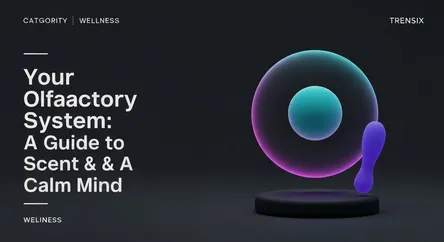Wellness
Your Olfactory System: A Guide to Scent & a Calm Mind

Discover how your olfactory system (sense of smell) works and why it's a powerful tool for mindfulness, memory recall, and emotional well-being.
What is it?
The olfactory system is the sensory system responsible for our sense of smell. When we inhale airborne molecules, they are detected by olfactory receptors in our nasal cavity. Unlike other senses that first pass through the brain's sensory relay station, these signals travel directly to the limbic system—the part of the brain governing emotion and memory. This unique neural pathway explains why a particular scent can instantly trigger a vivid memory or a strong emotional response, connecting our past experiences with our present feelings in a powerful way.
Why is it trending?
In wellness and mindfulness, the olfactory system is gaining attention as a direct route to influencing our mental state. Practices like aromatherapy, which use essential oils to improve well-being, have surged in popularity. People are increasingly using specific scents to create calming or energizing environments. Scent is also being integrated into mindfulness routines, such as meditation, to serve as an anchor. By focusing on a fragrance, individuals can ground themselves in the present moment, making it a simple yet effective tool for mental clarity and stress reduction.
How does it affect people?
Engaging the olfactory system can profoundly impact daily life and emotional health. Intentionally using scents can help manage stress, reduce anxiety, and improve sleep quality. For example, lavender is widely known for its calming properties. Because smell is so closely tied to memory, certain aromas can evoke feelings of comfort and nostalgia, boosting mood. This direct mind-body connection allows people to use their sense of smell as an accessible self-care tool, helping to regulate emotions and foster a greater sense of peace and presence.